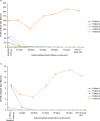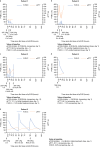Efficacy and safety of recombinant porcine factor VIII in Japanese patients with acquired hemophilia A
- PMID: 39158833
- PMCID: PMC11415465
- DOI: 10.1007/s12185-024-03823-y
Efficacy and safety of recombinant porcine factor VIII in Japanese patients with acquired hemophilia A
Abstract
Acquired hemophilia A (AHA) is a rare bleeding disorder caused by autoantibodies inhibiting human factor VIII (hFVIII). This phase II/III open-label study evaluated the safety and efficacy of recombinant porcine factor VIII (rpFVIII, susoctocog alfa) in adults with AHA and severe bleeding episodes in Japan (NCT04580407). The initial rpFVIII dose was 200 U/kg, with subsequent doses based on clinical measures including plasma FVIII activity. The primary efficacy endpoint was the proportion of severe bleeding episodes with a positive response to rpFVIII therapy 24 h after treatment initiation. Five patients were eligible for, and completed, rpFVIII treatment (age group: 60s-80s; median hFVIII inhibitor: 52 BU/mL; porcine FVIII [pFVIII] inhibitor: 3/5 patients). The median (range) total dose/patient was 548.4 (198-1803) U/kg with a median 3.0 infusions/patient. All patients responded positively to rpFVIII therapy at 24 h regardless of baseline pFVIII inhibitor status. rpFVIII treatment was well tolerated with no adverse events of special interest such as thromboembolic events or de novo pFVIII inhibitors. This study supports the use of rpFVIII as a novel therapy in the clinical management of patients with AHA in Japan. rpFVIII was approved for treating bleeding episodes in adults with AHA in Japan in 2024.
Keywords: Acquired hemophilia A; Factor VIII deficiency; Japanese patients; Recombinant porcine factor VIII.
© 2024. Takeda Pharmaceutical Company Limited.
Conflict of interest statement
YS reports grants from Chugai Pharmaceutical, Kyowa-Kirin Co. Ltd., and Takeda Pharmaceuticals; contracts for clinical trials from Chugai Pharmaceutical and Takeda Pharmaceuticals; consulting fees from Takeda Pharmaceuticals; and payment/honoraria from Asahi Kasei, Chugai Pharmaceutical, CSL Behring, Novo Nordisk, Sanofi, and Takeda Pharmaceuticals. YO reports consulting fees and payment/honoraria from Chugai Pharmaceutical. TKikuchi reports no conflicts of interest. ES is an editor of the International Journal of Hematology, and reports consulting fees from Bristol Myers Squibb Japan, Otsuka Pharmaceutical, Servier, and Ohara Pharmaceutical Co. Ltd.; and payment/honoraria from Janssen Pharmaceuticals, Novartis, Pfizer, Sanofi, and Takeda Pharmaceuticals. YMizuta, TKitagawa, KT, and YMiyaguchi are all employees of Takeda Pharmaceuticals. KN reports grants and payment/honoraria from Bayer, Chugai Pharmaceutical, CSL Ltd., Fujimoto Pharmaceutical Corp., KM Biologics, Novo Nordisk, Sanofi, Sekisui, Sysmex, and Takeda Pharmaceuticals. TM reports grants from Chugai Pharmaceuticals and Novo Nordisk; consulting fees from Bayer, Chugai Pharmaceuticals, Novo Nordisk, Pfizer, and Takeda Pharmaceuticals; and payment/honoraria from Bayer, Chugai Pharmaceuticals, CSL, JB Pharma, KM Biologics, Novo Nordisk, Sanofi, Sysmex, and Takeda Pharmaceuticals.
Figures


References
Publication types
MeSH terms
Substances
Supplementary concepts
LinkOut - more resources
Full Text Sources
Medical

